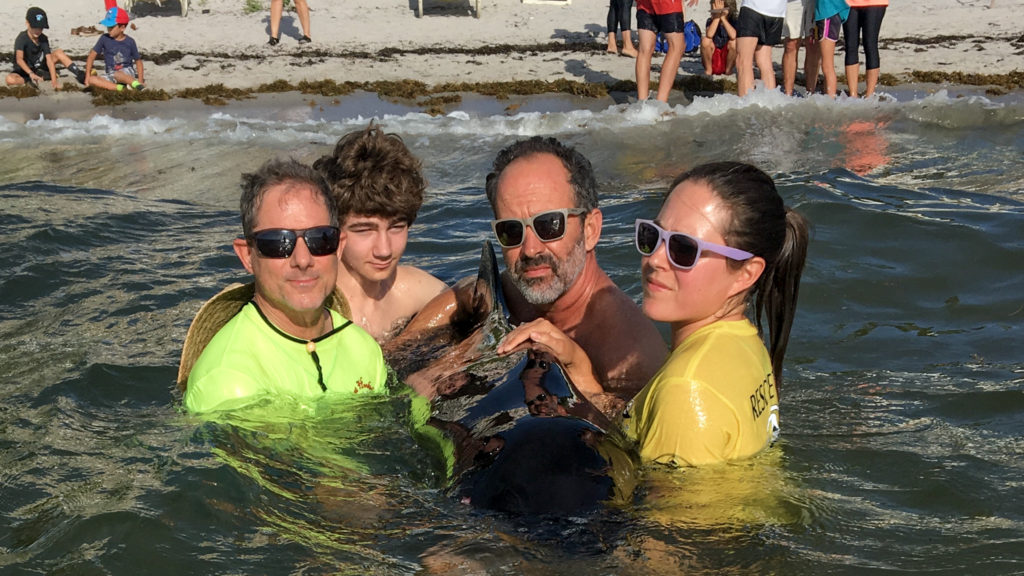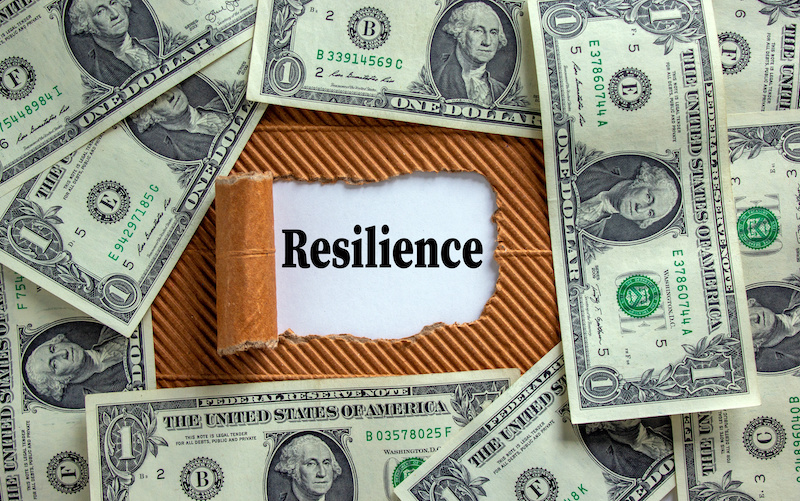Rare Whale Beaching on Key Biscayne Ends Sadly
Annali HaywardJuly 8, 2019
Early Friday morning, local ecowarrior Manny Rionda of nonprofit beach cleaning organization Fill-A-Bag arrived at the local beach for the post-July 4th beach cleaning he’d helped organize, together with partner Plastic Retriever.
He expected to find fireworks debris and trash left behind by holidaymakers.
What he saw instead was far more distressing.

A group holds a dwarf sperm whale that beached off Key Biscayne, July 5, 2019. Pictured, left to right, are Darrell Nicholson, Jake Nicholson, Manny Rionda, and Shannon Jones (Key News/Lara Nicholson)
At the southern edge of the Ocean Club property there were four people in the water holding a large mammal, described by Rionda as 7 to 8 feet long, all black. Several Village police officers were at the scene along with volunteers from the Marine Animal Rescue Society.
After several minutes a marine biologist from the National Oceanic and Atmospheric Administration arrived along with a veterinarian to assess the mammal’s condition.
NOAA spokeswoman Allison Garrett later confirmed the mammal was a female adult dwarf sperm whale. The whale was lactating after recently giving birth, and was also “very thin,” according to Garrett.
“From a layman’s perspective she looked kind of lethargic,” said Rionda.
The MARS team was counting her breaths and asking the civilian volunteers who were assisting to hold on to her tightly to avoid the danger of her thrashing.
While this was happening a MARS volunteer went to investigate a reported sighting of another beaching further down the shore toward the Cape Florida Lighthouse. When she returned quickly, Rionda said, it was clear the second stranded animal – a female calf – was already dead.
Minutes later the veterinarian and biologists agreed the only course of action was to euthanize the adult.
It remains uncertain whether the adult whale was the calf’s mother. Tests taking place at the NOAA facility on Virginia Key may take up to two months to determine that as well as the cause of illness and death.
“It was an act of mercy, from my perspective,” said Rionda, who along with the other residents and volunteers present helped gently lift the whale back onto the beach for sedation first.
“At that point I asked if they needed my help anymore, as I didn’t want to see the rest,” said Rionda. “It was rough.”
Very little is known about the dwarf sperm whale species, as sightings are extremely rare, even in the open water. The total population size is unknown, but some estimates put it at around 3,800.
“When offshore animals like these strand, there is typically something wrong that needs immediate attention by trained professionals,” said Garrett.
“I’ve been on this beach for 50 years and never even heard of something like this,” said Rionda.
The Village of Key Biscayne sent out an advisory notice for residents not to attempt to help by pushing live animals back out into the water, as this can delay examination and treatment. Animals can also then restrand in worse condition. Instead, residents should report live stranded, dead or injured animals by calling 1-877-WHALE-HELP.


